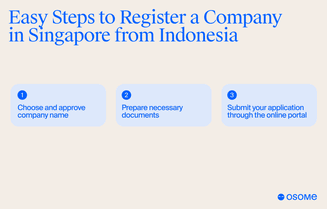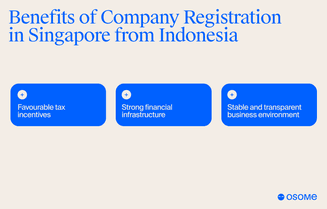The Ultimate Guide to Company Registration in Singapore from Indonesia
- Published: 23 January 2025
- 12 min read
- Starting a Company


Heather Cameron
Author
From expert guidance and helpful accounting tips to insights on the latest trends in fintech, Heather is here to empower entrepreneurs and small business owners in Singapore with great content. With a background in digital marketing spanning eight years, she has experience writing for various industries and audiences. As Osome’s copywriter, she’s here to inform and inspire our readers with great storytelling.

Nisah Rahim
Reviewer
Nisah Rahim is our go-to expert reviewer for all things Corporate Secretary-related in Singapore. As the Corporate Secretary Team Lead and content reviewer, Nisah meticulously examines our blog posts to ensure we provide comprehensive information on Corporate Secretary services such as local regulatory compliance, managing board meetings, maintaining company records, and providing expert advice on corporate governance matters.

Imran Marican
Reviewer
Imran Marican, ATA SCTP member, is our Corporate Tax Assistant Manager based in Singapore, with almost a decade of experience in Singapore corporate tax. With in-depth knowledge of Singapore corporate tax law and regulations, he can help with corporate tax compliance that matters to every company. While our business writers transform complicated tax jargon into easy-to-understand concepts, as a reviewer for the Osome blog, Imran ensures our content is accurate and relevant, helping our readers boost their businesses with helpful tips and insights.
Looking to register a company in Singapore from Indonesia? This guide will walk you through essential steps, from selecting a business structure to filing your application with ACRA.
Key Takeaways
- An easy company registration process in Singapore is streamlined and regulated by ACRA, allowing foreign company leaders from Indonesia to establish businesses efficiently while ensuring compliance with local laws.
- Selecting the appropriate business structure is critical, with a private limited company (Pte Ltd) being the most common choice due to its limited liability and separate legal identity status.
- Post-incorporation essentials, such as corporate bank account opening, fulfilling compliance requirements through a corporate secretarial firm, and budgeting for yearly accounting fees, are vital for maintaining the company’s good standing and successful operation in Singapore.
Understanding the Basics of Company Registration from Indonesia
The company registration process in Singapore is regulated under the Companies Act 1967, Chapter 50, and overseen by the Accounting and Corporate Regulatory Authority (ACRA), which ensures the accuracy of company particulars. ACRA ensures that all businesses comply with local regulations, making it a critical player in the registration and compliance landscape. Singapore’s reputation as an entrepreneurial hub is bolstered by its streamlined business registering process, which can often be completed online. This ease of registration is a significant draw for foreigners looking to establish a presence in a business-friendly environment.
Singapore’s entrepreneurial-friendly policies and regulatory framework make it easier for Singapore businesses and regional businesses to thrive. Companies in Singapore are recognised as separate legal entities, allowing them to own assets, enter into contracts, and operate independently of their owners. This legal separation is crucial for protecting personal assets and limiting liability, making Singapore an attractive destination for business registration.
Thinking of registering a company in Singapore? Osome can help! We offer efficient company incorporation services to streamline the process and ensure you comply with all legal requirements. Our team can guide you through the incorporation process in Singapore, so you can focus on turning your business idea into a reality.
This process of registration, supported by the Singapore government and corporate service providers, helps mitigate the complexities often associated with starting a business. Entrepreneurs can focus on their business activities without being bogged down by red tape. Grasping these basics sets a solid foundation for navigating the specifics of business registration in Singapore from Indonesia.
How To Choose the Right Business Structure?
Selecting the appropriate business structure is a critical step in company registration. In Singapore, the main business structures available are private limited companies (Pte Ltd), sole proprietorships, limited liability partnerships (LLPs), and business entities. Each structure has its unique advantages and disadvantages, and the choice depends on various factors including the nature of the business, the level of risk you’re willing to take, and your long-term business goals.
The private limited company (Pte Ltd) is the most common choice among entrepreneurs due to its separate legal identity status. This private limited company structure protects personal assets, offers potential tax benefits, and provides continuity even if ownership changes. However, this Pte Ltd company structure comes with stricter regulatory demands compared to sole proprietorships and limited liability partnerships (LLPs).
A sole proprietorship is simpler to register but places the owner at risk of personal liability for business debts. On the other hand, a limited liability partnership combines elements of a corporation and a partnership, offering flexible management and liability protection for partners. Each structure has different compliance requirements and governance obligations, so it’s essential to carefully consider whether an LLP, Pte Ltd, or sole proprietorship aligns best with your Singapore business activities and future plans.
Steps To Register a Company in Singapore from Indonesia
Registering a company in Singapore from Indonesia involves several key steps. The process is governed by the Companies Act and supported by company registration facilitated by the Accounting and Corporate Regulatory Authority (ACRA).
First, you need to select a company name and get it approved by ACRA. Once the name is approved, you can proceed with preparing the necessary documents for company incorporation.
Finally, you will submit your application through the BizFile+ portal, which is the official online platform for business registration in Singapore.

Selecting a company name
Selecting and getting approval for your company name from ACRA is the first crucial step as you register your company. The name must be unique and comply with ACRA’s guidelines, which prohibit names that are too similar to existing ones, contain undesirable connotations, or include prohibited terms. Use the BizFile+ online portal to apply for name approval. Once approved, you have 120 days to complete the business registering process before the name is released.
Preparing required documents
Once the company name is approved, the next step is to prepare the required documents for company formation, possibly with the help of a company secretary. These include the company’s constitution, identification details of shareholders and directors, and share certificates. If any documents are not in English, they must be translated by a reliable agency to ensure compliance with Singapore’s regulations.
Having all the necessary documentation in order, including details for business licenses, is crucial as you register your company through a registered filing agent. Proper organisation and preparation with the help of a professional firm such as a corporate secretarial firm can help you avoid delays and ensure that your application is processed efficiently.
Submitting your application
With your documents ready, you can now submit your application through the BizFile+ portal along with the required registration fee. You will need a SingPass Login ID to access the portal and must provide an SSIC code for your business entity. If you do not have a SingPass, consider engaging a registered filing agent or corporate secretarial firm, or ensuring stakeholders consent online within 120 days of name approval.
Key Requirements for Company Incorporation from Indonesia
Incorporating a Singapore company requires meeting several key requirements. These include having the right shareholders and directors, ensuring sufficient initial paid-up capital, and providing a local registered address. Each of these requirements is crucial for compliance and the successful establishment of your business.
Key Requirement | Description |
|---|---|
| Shareholders and directors | At least one director who is a Singapore citizen, permanent resident, or holds a valid work pass, which is issued under the entity. At least one shareholder. Share certificates must be issued. |
| Initial paid-up capital | Minimum of 1 Singapore dollar. Higher capital can enhance credibility and attract investors. |
| Registered address | Must be a physical address in Singapore, not a P.O. box. Serves as the official point of contact. |
Shareholders and directors
Every company in Singapore must have at least one director who is a Singapore citizen, permanent resident, or someone with a valid work pass. Foreign nationals can also serve as directors if they reside in Singapore. Additionally, each company must have at least one shareholder, and share certificates must be issued as proof of ownership.
Compliance with these requirements ensures that your Singapore company remains in good standing with local regulations. It is also essential to appoint a qualified company secretary within six months of incorporation to handle compliance and administrative tasks.
Initial paid-up capital
The minimum initial paid-up capital required to establish a local company in Singapore is just 1 Singapore dollar. This minimal requirement makes it accessible for entrepreneurs to start their businesses without a significant financial burden, especially when accounting for capital gains during growth phases. However, having a higher paid-up capital can enhance your company’s credibility and attract potential investors.
Registered address
A local company-registered office address is mandatory when registering a company in Singapore. This address must be a physical location and not a P.O. box, as required by the inland revenue authority for tax purposes. The registered address serves as the official point of contact for government correspondence and enhances the company’s credibility.
Post-Incorporation Essentials
After incorporating your Singapore company, there are several essential tasks to complete. One of the primary tasks is to open a corporate bank account to manage your company’s finances. To open the account, you will need to present specific documents, including the registration certificate and identification details of directors and shareholders, with at least one director identified as a Singapore citizen.
If your business anticipates an annual turnover of more than S$ 1 million, you are required to register for Goods and Services Tax (GST). Even if not required, voluntary GST registration can allow you to claim input tax credits.
After incorporating your company, open a corporate bank account and consider voluntary GST registration through a company secretary, even if it's not required. This lets you claim input tax credits and prepares your business for future growth, as being GST-registered can streamline partnerships with vendors and clients who prefer working with GST-compliant businesses.
Visa Options for Foreign Entrepreneurs
Foreigners looking to establish a business in Singapore have several visa options. The two main types are the Employment Pass and the Entrepreneur Pass (EntrePass). Each visa type has specific requirements and tax benefits, making it essential for foreign business leaders to choose the one that best suits their company's business profile.
Employment pass
The Employment Pass is designed for foreign professionals who wish to work in Singapore. However, holders of this pass cannot serve as local directors; therefore, hiring nominee director services at the time of company incorporation is necessary. Once in Singapore, the nominee director can be replaced, allowing the entrepreneur to take charge of the company.
A qualified company secretary can assist with compliance and track important deadlines, ensuring that your business remains in good standing. This support is crucial for leaders of offshore companies and other private companies who may be unfamiliar with local regulations.
Entrepreneur Pass (EntrePass)
The Entrepreneur Pass (EntrePass) is ideal for foreign business leaders looking to run innovative or venture-backed businesses in Singapore. To qualify, applicants must meet criteria set by MOM, such as having a viable business plan and relevant experience. The business must also be less than six months old at the time of application
Once granted, the EntrePass allows the entrepreneur to serve as the company’s local director and manage their business operations directly. This visa option supports innovative businesses and provides a pathway for entrepreneurs to establish a strong presence in Singapore.
Compliance and Ongoing Requirements
Compliance with local regulations is crucial for the longevity and success of your business in Singapore. Companies are required to file their annual returns within one month after holding the Annual General Meeting (AGM), which must be conducted every calendar year within 18 months of incorporation. Additionally, corporate and personal income tax returns must be submitted by November 30 for paper submissions and electronic submissions.
After incorporating your company, open a corporate bank account and consider registering for Goods and Services Tax (GST), even if it's not mandatory. Voluntary registration allows you to claim input tax credits.
These ongoing compliance requirements ensure that your Singapore company remains in good standing with ACRA and avoids penalties.
Advantages of Registering a Company in Singapore from Indonesia
Registering a company in Singapore offers numerous benefits, particularly for entrepreneurs from Indonesia. Singapore is known for its attractive tax incentives, including the Start-Up Tax Exemption (SUTE) and Partial Tax Exemption (PTE) schemes. These incentives significantly reduce the tax burden on new businesses facing corporate tax rates, allowing them to reinvest profits into growth minimise taxable income effectively.

Additionally, Singapore’s financial infrastructure and strategic location make it an ideal hub for international trading and business expansion. The country’s reputation for stability and transparency further enhances its appeal, providing a solid foundation for business success.
Cost and Timeframe for Company Registration
The cost of registering a company in Singapore starts at S$ 315, which includes a S$ 15 registration fee for business name registration and a S$ 300 processing fee as part of the company registration fee. Foreign business owners may incur additional business expenses for services like hiring a nominee director or a company secretary. The typical timeframe for registration is between 1 and 3 days, although it can be completed in as little as one day for common business purposes.
This efficient and cost-effective registration process makes Singapore an attractive destination for entrepreneurs looking to establish a new business. Understanding the costs and timeframe involved helps ensure a smooth and predictable registration experience.
Common Challenges and How To Overcome Them
Common challenges during registration include difficulty in selecting a compliant company name and misunderstanding document submission requirements. These issues can lead to delays and potential non-compliance with ACRA’s regulations. To overcome these challenges, entrepreneurs should familiarise themselves with ACRA’s guidelines and seek professional assistance when necessary.
Being well-prepared and understanding the registration fees and process are crucial for avoiding common pitfalls. By addressing challenges proactively, entrepreneurs can ensure a smooth and efficient incorporation process, allowing them to focus on growing their business profile.
Osome can help you navigate the complexities of company registration in Singapore. Our team of experienced professionals can guide you through the process, ensuring you meet all legal requirements and avoid common pitfalls. Contact us and learn more about our Singapore incorporation services!
Summary
Registering a company in Singapore from Indonesia is a strategic move that offers numerous benefits, including attractive tax incentives, a robust financial infrastructure, and a business-friendly regulatory environment. By understanding the basics of Singapore company registration, choosing the right business profile, and following the step-by-step process, entrepreneurs can easily navigate the complexities of incorporation.
In conclusion, the opportunities for growth and expansion make it an ideal destination for Indonesian entrepreneurs. By staying informed about key requirements, post-incorporation essentials, and visa options, you can ensure a successful and compliant business journey. Take the first step today and unlock your business's potential in one of the world’s most dynamic economic hubs.






